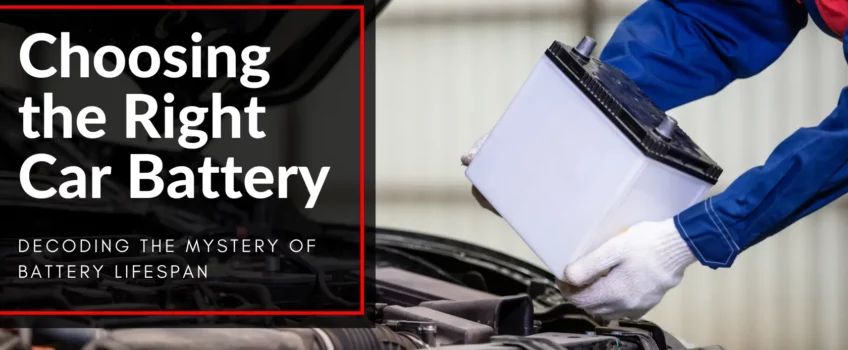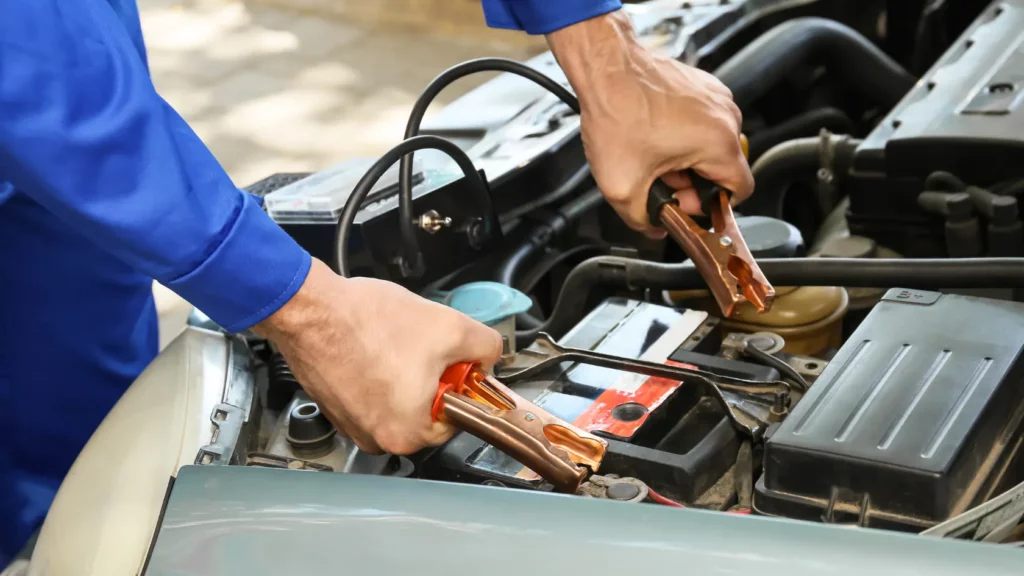
What Type of Car Battery Lasts the Longest?
Ever found yourself stranded in the middle of nowhere because your car battery decided to call it quits? We’ve all been there, right? Well, let’s dive into this ultimate guide to understanding which type of car batteries could last the longest.
The Essence of the Car Battery
Imagine your battery as the beating heart of your vehicle. Just like how our hearts pump blood throughout our bodies, the car battery powers up every electrical component of your vehicle. Sounds crucial, doesn’t it? That’s because it is!
How Many Types of Car Batteries Are There?
This is a great question as there are primarily five types of vehicle batteries, each with their pros and cons but which one outlives them all?
- lead-acid
- lithium-ion
- nickel-metal hydride
- absorbed glass mat
- deep cycle batteries
Lead-Acid Batteries
For starters, lead-acid batteries have been the go-to for most car owners. They’re like the good old reliable friend you can count on. However, their lifespan usually ranges from 3 to 5 years. Is that the longest? No, not really so let’s move onto the next one.
Lithium-Ion Batteries
Next up, we have the lithium-ion batteries. They’re the young, flashy, tech-savvy batteries. Thanks to their high energy density, they power up electric vehicles and hybrids. But, do they last longer than their lead-acid counterparts? In most cases, yes, they can last between 3 to 10 years, but their lifespan can dramatically decrease with frequent fast charging.
Nickel-Metal Hydride Batteries
The nickel-metal hydride batteries, often found in older hybrid cars, can match the lifespan of lithium-ion batteries, assuming they’re treated with the same care. They’re like the quiet kid in class who surprisingly matches the star student’s grades.
Absorbed Glass Mat Batteries
We’re not done yet! Let’s not forget about the absorbed glass mat batteries (AGM). These are the sturdy, robust ones that don’t mind extreme temperatures. On average, they have a life expectancy of 3 to 6 years.
Deep Cycle Car Batteries
Last but not least, we have the deep cycle batteries. They’re like the marathon runners of the battery world, designed for long, sustained power output. They can have a life expectancy of up to 8 years, given the right conditions and quality of care.
So, Which One Lasts the Longest?
Think of this like a suspenseful film. We’ve introduced all the characters, now let’s reveal the hero. The answer, is … the lithium-ion batteries! Yes, they’re the ones that can potentially last the longest among all types of vehicle batteries. But, there’s a catch. Just like the tortoise and the hare fable, they need to be slow and steady to win the race.
Why Does a Lithium-Ion Car Battery Last Longer?
Imagine lithium-ion batteries as the long-distance runners. They don’t like to sprint and they also don’t like being overworked. In simpler terms, their longevity depends on factors like charging habits, temperature, and usage. Treated right, they can outlive their peers.
Tips to Prolong the Lifespan of Lithium-Ion Batteries
You might ask, “How can I treat my car battery right?” As experts in the automotive sector, we can tell you a thing or two about car battery maintenance. So, here a few handy tips on how to make your car battery last longer.
Opt for Slow Charging
Yes, it might be tempting to fast-charge your electric vehicle but remember our tortoise and hare analogy. Be patient, slow and steady charging helps prolong your battery life.
Keep the Battery Cool
Ever worked out in scorching heat? Not fun, right? Your battery feels the same way as high temperatures can put additional strain on the battery which can reduce its lifespan. Try to park in the shade or a garage whenever possible.
Avoid Complete Discharge
Avoid driving your electric vehicle to the point of battery depletion. Instead, aim for regular, smaller charges to keep your battery in the optimum state.
Understanding Car Battery Warranties
Choosing a battery with a longer warranty is like choosing a safety net. It’s a wise decision as batteries with longer warranties tend to last longer as they are made of higher-quality materials.
Choosing the Right Battery for Your Vehicle
Now, you might be thinking, “Should I just get a lithium-ion battery then?” Not so fast. Your choice should also depend on the type of vehicle you own and your driving habits. Consult with your car technician or car battery provider to make an informed decision.
While lithium-ion batteries do have a longer potential lifespan, the type of battery you need largely depends on the specific requirements of your vehicle and lifestyle. It’s much like cooking – you can’t simply throw all the ingredients into a pot and hope for the best. It requires a specific recipe. Let’s take a closer look at what makes up this ‘car battery recipe’.
Type of Vehicle
The type of vehicle you own plays a significant role in the kind of car battery you need. If you own an electric vehicle or a hybrid, lithium-ion batteries are often your best bet due to their high energy density and efficiency.
However, if you have a petrol or diesel engine vehicle, a traditional lead-acid battery or an absorbed glass mat battery might serve you better.
Driving Habits
Next, let’s consider your driving habits. Are you a long-distance highway driver, or is your driving mostly limited to short, city trips? If you’re in the former group, your battery gets the chance to recharge fully, and lithium-ion or deep cycle batteries may suit you. But if you belong to the latter group, you might want to consider a robust battery like an absorbed glass mat that can handle frequent starts and stops.
Climate
And let’s not forget about your local climate. If you live in an area with scorching summers or freezing winters, you need a battery that can withstand these extremes. Absorbed glass mat (AGM) batteries are known for their resilience in such conditions.
How Can I Tell When My Car Battery Is Dying?
Car batteries don’t always give you forewarning before they quit, but there are few ways to tell when one is about to give up. Keep an eye on the following and when in doubt, book a FREE battery check at Elite Garages:
- Corrosion on the connectors
- Warped battery case
- A rotten-egg smell when you open the bonnet
- Dim headlights
- Electrical issues
- Clicking when turning the key (or a slow-starting engine)
- Check engine light on your dashboardA slow engine crank
- Frequent jump starts
How Much Does It Cost To Replace A Battery In My Car?
The type of car battery you choose will significantly impact the cost. Traditional lead-acid batteries are usually the most affordable, ranging from £60 to around £120. On the other hand, absorbed glass mat batteries, known for their durability and performance, may cost between £100 and £200.
If you’re replacing the battery in an electric or hybrid vehicle, the high-capacity lithium-ion batteries can range anywhere from £500 to over £1000, depending on the vehicle model.
You also need to account for the service fee for the battery installation, which can range from £20 to £50 at most garages. Some services might offer to install the battery for free if you buy the battery from them, so it’s worth shopping around.
Contact your nearest Elite Garages for more information on the different types of car batteries and prices.
Consult an Expert
Given all these factors, choosing the right battery for your vehicle might seem like a complicated task. That’s where professional help comes in. Consult with your car technician or car battery provider, like Elite Garages, who can take into account your car model, the local climate, and your driving habits to find the perfect match for you.
The world of car batteries might seem complex, but with a basic understanding and some professional advice, you can navigate it effectively. Remember, the right battery is like the perfect pair of shoes. It needs to fit you and your lifestyle perfectly.
Why Choose Elite Garages For Your Car Car Battery?
In addition to battery tests, Elite Garages also offer advice on any parts that may need replacing or if anything else could be problematic. We have a wide selection of car batteries suitable for most makes and models at great prices. Here’s what we offer you:
- Competitive battery pricing
- Same-day car battery fitting
- Batteries are fitted while you wait
- Quality batteries that come with a guarantee
- FREE Battery Check
FAQs
Click the + to read any answer or visit our most FAQ page to review the most frequently asked questions across all our Elite Locations.
If you click on a ‘Category’ or ‘Tag’ link, the page will ‘refresh’ and reload the page showing the top of the page first, you’ll then just need to scroll down to the FAQ section to see the results for the Category or Tag you selected.
Here are common signs to look out for when diagnosing a potentially failing car battery:
- Slow engine crank during start-up.
- Dim headlights and electrical issues.
- Needing frequent jump-starts.
- Battery warning light illuminated on the dashboard.
- Swollen or bloated battery case.
- Age of the battery (3 to 5 years).
If you experience any of these indicators, it’s advisable to have your battery tested by a professional to determine if a replacement is needed.
The cost of replacing a car battery in the UK ranges from £100 to £400, depending on various factors such as size, type, brand, quality, and warranty. It’s best to contact your nearest Elite Garages to find out more about different types and the cost as the price can vary, especially when it comes to electric vehicles and hybrids.
To determine the appropriate size of car battery for your vehicle, you will need to consider a few factors such as the make, model, and year of your car. The most reliable way to identify the correct battery size is to consult your vehicle’s owner’s manual or check the specifications provided by the manufacturer. The owner’s manual usually contains information about the recommended battery group size or specific Cold Cranking Amps (CCA) requirement for your car.
When it comes to car batteries, the longevity can vary depending on various factors such as usage patterns, climate conditions, and maintenance practices. However, some types of car batteries are generally known for their longer lifespan. Here are a few types with an average estimation:
- Lead-Acid Batteries: 3 to 5 years
- Lithium-Ion Batteries: 3 to 10 years
- Nickel-Metal Hydride Batteries: 3 to 10 years
- Absorbed glass mat batteries (AGM): 3 to 6 years
- Deep cycle batteries: Up to 8 years
About Us
Opening Times
Saturday : 8:30–4:00
Sunday : closed
More Information
Contact UsCustomer Information Pack
Check MOT Due Date
Free MOT reminder
Careers
Legal Information
Recent Posts
- Why Modern Car MOT Failures Are Becoming More Common
- Elite Garages Croydon Is Open for Car Servicing and MOTs in South London
- Elite Garages Poole Is Now Open for MOTs, Tyres and Car Servicing
- The Most Common Car Questions UK Drivers Ask, And What They Usually Mean
- Why Short Winter car Journeys Cause So Many Common Car Problems




